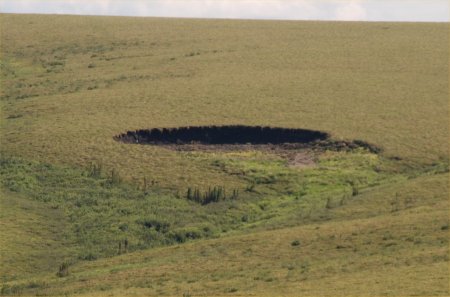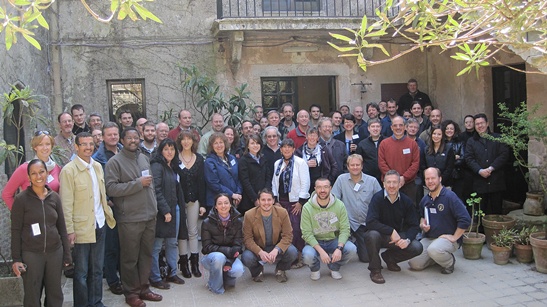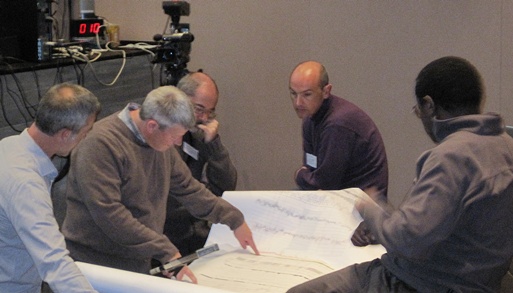
"None loves the messenger who brings bad news."
So wrote the Greek playwright Sophocles, and as he doubled as a general and politician, he knew whereof he spake. Perhaps this ancient wisdom helps explain why climate scientists are being hounded, mocked, and vilified like no one since Judas. Phil Jones, the British scientist whose perhaps intemperate e-mails were hacked, published, and recklessly seized upon as evidence of scientific fraud (evidence that failed to hold up to scrutiny), felt so persecuted he nearly took his own life.
Jones and his colleagues have been cleared of all misconduct charges by multiple review panels. Arguably, however, they invited wrath. Even a scientist ought to know that nothing you put in e-mail can be considered truly private.
Ken Dewey, on the other hand, did nothing worse than drive through the northern tundra of Canada and Alaska taking pictures that document the dramatic effects of rapid climate change. For this, he has been shouted down at civic group meetings, called "un-American" and a "liberal traitor," and harangued in parking lots of organizations where he was the invited guest speaker. Dewey, a University of Nebraska climatologist, admits to being shaken by the hostility of his audiences.
Mind you, Dewey's not engaged in climate model muddling, politically fueled speculation, or manipulation of anybody's data. He's just taking pictures. Pictures that show roads buckling as the permafrost they were built on melts and trickles away, pine forests devastated by beetles that have moved north into territory where in the past they could not survive the winters, and sinkholes in ground once buttressed by ice. (See the example below, reprinted with Dewey's permission.) Somehow that makes him un-American. Give me a break!

Of course, the vast majority of climatologists, geologists, and other scientists directly involved in climate change research are not engaged in shenanigans, either. But to listen to right-wing talk show hosts and bloggers, you would think they are all on Al Gore's payroll. "The now-notorious intercepted e-mails that reveal leading global warming supporters exchanging plans to squelch critics and falsify data are just the tip of the iceberg," writes Bob Unruh of Worldnet Daily, while promoting a denier book by TV weatherman turned talkshow windbag Brian Sussman. ("Intercepted" -- that's a nice way of describing a hack. Makes it sound like the NSA just doing its job.)
If people would tune out the hate merchants and oil industry shills, if they would look for themselves, perhaps they would come to appreciate the role scientists play in keeping us alive and well. As regular readers know, earlier this month I had a chance to participate in a gathering of dozens of ANDRILL scientists from all over the world. They met in Sicily to attempt to integrate thousands of different data that each had teased out from a nearly mile deep core drilled from the Antarctic three years earlier.
I gained such deep admiration for these scientists -- and by extension all the others working on climate science. They work so hard and with such passion. Not a passion for some grand political statement, but for a tiny increments of clarity. What, exactly was the antipodal climate some 17 million years ago? How and why did it change? Were the changes global, regional or local? These are the kinds of questions they are trying to answer.
To what scientists call a "good approximation," the answers are already in. There is no reasonable doubt about the trajectory of our climate today -- it is warming -- nor the significant contribution of industrial burning of fossil fuels. (For a fine summary of the evidence, go here.) Similarly, there is no reasonable doubt about our climate history: variations in greenhouse gases, solar influences, and other factors, such as vulcanism, have driven wide swings in global climate down the ages.
Below that approximation, at a finer scale, it is incredibly difficult to read the record or make predictions. Feedback loops and threshold changes introduce chaos into climate change. This means that a pattern of predictable change can be overwhelmed in an unpredictable way by chaos. That appears to be the case with ice sheets. By everything known about the immense East Antarctic ice sheet, it should be stable even in warm conditions. But the geologic record suggests otherwise. (You can read my story about this in Scientific American here.) How to tease out the factors that introduce chaotic change into something as vast and cold as the East Antarctic ice sheet is a challenge that won't be easily solved, I suspect.
But the ingenuity of the scientists working on the problem is astounding. Watching them at work I sometimes felt like a man looking through a kaleidoscope while riding a Merry-go-Round. The bits of evidence are so fragmentary, and the span of time across which they are scattered is so long. It's astonishing to see how they can make systematic connections among them to read out a coherent record. It's also admirable to see how disciplined they are about resisting the urge to leap to conclusions.
Scientists are often criticized for declining to make definitive statements and for pleading for more time and resources to conduct further research. It's true that, over the course of a week, I was able to use my journalistic powers of persuasion to draw a few juicy quotes from scientists I interviewed. But in discussions with each other the scientists showed nothing but a determination to get as close to the truth as they possibly can. In doing so, they are willing to cast off previously held "certainties," such as ice-sheet stability, and follow the evidence. If that evidence led to a determination that current indications of global warming will turn around, I am certain they would accept it. If there is one thing scientists respect above all else, it is evidence.
Already, they have saved civilization, in all likelihood, by bringing to light the evidence that continued use of chlorofluorocarbons (CFCs) would deplete the ozone layer in the upper atmosphere, exposing us and our crops to deadly ultraviolet radiation. Since the cost of halting production of CFCs was relatively minor compared with the benefit, the world came together and agreed to do it.
The short-term costs of weaning ourselves from fossil fuels are much greater, as is the power of producers and fossil fuel dependent industries. Hence, we see a highly successful propaganda campaign of denial and vilification. But shoving copies of Al Gore's book into snowbanks or savoring an adrenaline jolt from an overpaid hate-monger raving about socialism won't save our kids and grandkids from our folly. The American public would do well to heed one other piece of ancient Greek wisdom.
"Whom the gods would destroy," wrote the playwright Euripides, "they first make mad."
